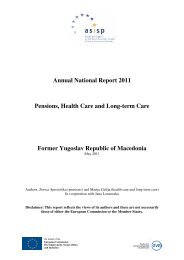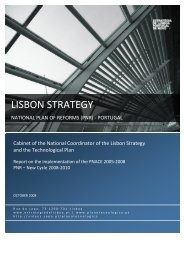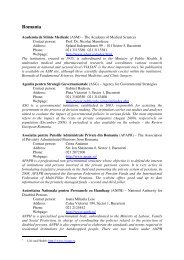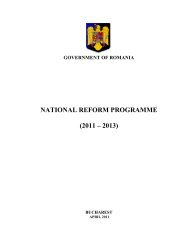National reform programme 2008-2010 Malta - European Commission
National reform programme 2008-2010 Malta - European Commission
National reform programme 2008-2010 Malta - European Commission
You also want an ePaper? Increase the reach of your titles
YUMPU automatically turns print PDFs into web optimized ePapers that Google loves.
Amendments to the Competition Act (Cap. 379)<br />
The Maltese Government is in the final stages of completing the amendments to the current<br />
legal framework with a view to reflect modern trends and therefore key changes to the<br />
present enforcement system will include:<br />
• a shift from the present criminal fining system to one of administrative fines; this will<br />
empower the OFC to actually impose fines on infringing undertakings, whereas under<br />
the current enforcement system fines may only be imposed upon conviction by a court<br />
of criminal jurisdiction;<br />
• clarifying and improving the standard procedure for investigation of infringements of<br />
Competition law – which include increasing the investigative powers of the OFC and<br />
introducing certain standard procedures into the current decision-making process with<br />
the aim of increasing transparency (in particular, clarifying the OFC’s obligation to issue<br />
a detailed statement of objections and to allow access to the file to the investigated<br />
undertakings);and<br />
• simplifying the decision-making process by entrusting decision making powers to a<br />
single body – namely OFC, whereas currently there is a two tier structure, with the OFC<br />
empowered to conduct investigations of serious infringements of the local Act and<br />
infringements of Article 81 and Article 82 EC while decision-making powers are<br />
entrusted to the <strong>Commission</strong> for Fair Trading.<br />
The introduction of a leniency <strong>programme</strong><br />
The OFC will introduce a leniency <strong>programme</strong> with a view to counter cartels as these have a<br />
damaging effect on consumers and the economy. This will permit the OFC to carry out its<br />
work in this area more effectively.<br />
In addition, it is to be noted that the current fining system provided for under the Competition<br />
Act (Cap. 379), whereby fines for the infringement of competition law may only be imposed<br />
upon conviction by a criminal court, does not allow for the adoption of any such leniency<br />
policy by the OFC. It must be pointed out that although the Competition Act does not<br />
concurrently contemplate a leniency policy. Nonetheless, it does provide for the possibility of<br />
extinction of criminal liability with regard to competition law infringements, upon signing of an<br />
agreement between the Director of the OFC and the offender. Thus, Article 26B of the Act<br />
provides that the Director of the OFC is to enter into an agreement in writing with the offender<br />
whereby the said offender pays or gives security to the satisfaction of the Director for the<br />
payment of a sum not less than fifty per centum of the minimum penalty applicable for the<br />
offence in question, and not more than seventy per centum of the maximum penalty<br />
applicable for the offence. Upon the signing of such agreement by the Director and the<br />
offender, all criminal liability of the offender under the Act with regard to the offence in relation<br />
to which agreement has been entered shall be extinguished.<br />
To strengthen competition, notably in professional services<br />
The OFC has continued internal consultations with Ministries and professional bodies<br />
responsible for the regulation of the liberal professions, in order to identify existing restrictions<br />
imposed by State legislation or self-regulation by professional bodies which may potentially<br />
raise competition concerns.<br />
The Competition Authority has finalised a first round of meetings with the pertinent authorities<br />
in order to identify possible problem areas. Meanwhile, the Office also conducted an<br />
independent assessment on the implications on each of the six professions. For each<br />
profession the said report deals with each category identified by the <strong>Commission</strong> as being of<br />
possible anti-competitive areas, that is:<br />
• Entry and Exclusive rights;<br />
• Fee Structure;<br />
• Advertising; and<br />
• Business Structure.<br />
<strong>Malta</strong> <strong>National</strong> Reform Programme <strong>2008</strong>-<strong>2010</strong> - 31 -







